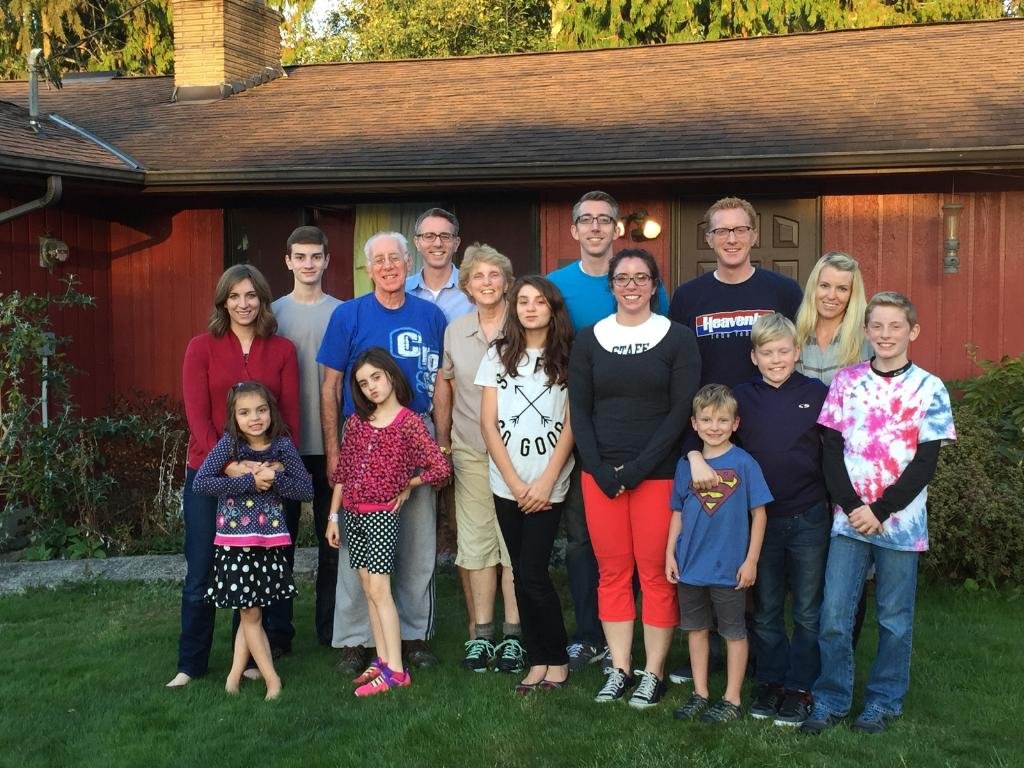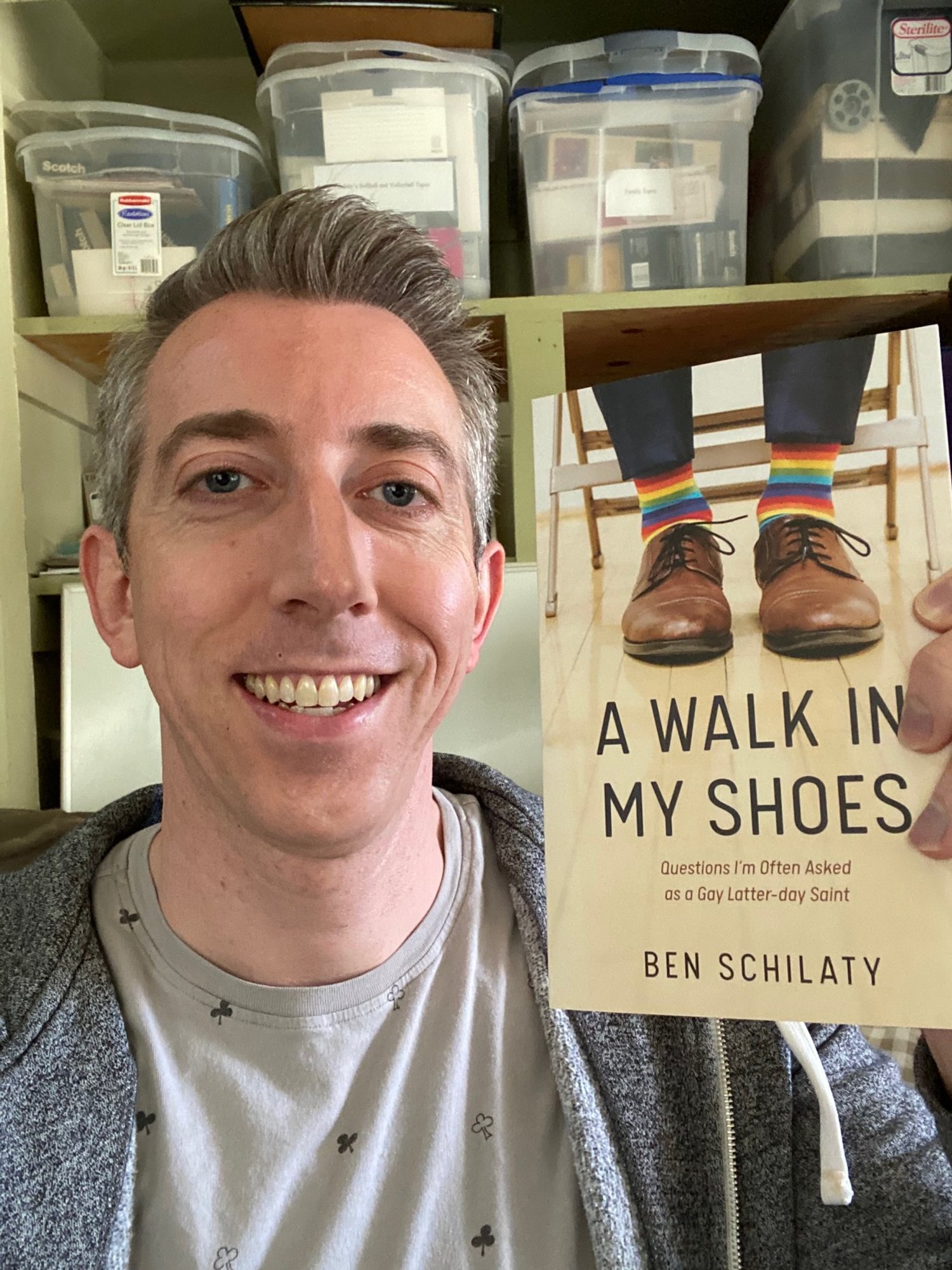At least once a week, there’s one particular professor at BYU who meets a student on campus for lunch. He’s exceptionally extroverted for an academic, and considers these lunches the highlight of his week. Over Cougar Eat confections, they discuss how to navigate life, love, and quite possibly, how to survive being gay at BYU. His is a story you may already know; his life is one most likely do not. But Ben Schilaty’s invited all to join him for a walk on his path in his memoir, A Walk in My Shoes: Questions I’m Often Asked as a Gay Latter-day Saint. Many wonder how does Ben do it? How does he live as an openly gay member of the LDS faith who not only observes the BYU Honor Code, but works within its office. But he does; and many who get to know him up close do walk away convinced he’s found a way to be content with a complex reality.
Every week, from a fancy Provo, UT studio (aka Ben’s basement), Ben joins his friend Charlie Bird on their podcast, Questions from the Closet, to discuss the unique paths they walk as openly gay men who try to stay tethered to the church they both served missions for (Charlie in CA, Ben in Mexico), and the gospel that they love.
Ben Schilaty was the youngest of four kids born to Seattle, WA-based parents who were active--both in the LDS church and in sports. His dad was a track star, his mom was a PE coach. His older brothers were basketball stars, and his older sister played three sports. Ben laughs that he preferred to play with My Little Ponies and watch TV. He appreciates that his parents supported his interests, and he remembers getting My Little Ponies for his birthdays and Christmas, and no one in his family heckled him for it. He was a child of the 80s-90s, and he also loved hot pink, but he would get teased by others for this, so he didn’t wear many hot pink things, besides a particular pair of pink and white-striped shorts he had to retire by age five when the heckling got too loud. Ben says, “My interests were different, but I don’t remember having crushes on boys as a kid. You were supposed to have crushes on girls, so I’d say I did. I had feminine tendencies and interests, but it wasn’t until I was around 11 that I noticed I was attracted to guys.”
In middle school, Ben would admire handsome, athletic guys, and at the time, he convinced himself he wanted to look like them or be like them, not like them. He was jokingly called Ben Gay (because of the commercial), and says, “That was terrifying to me; I didn’t want anyone to think that.” He says, “In middle school, guys are typically jocks or jerks, and I didn’t fit in with either.” As a youth, Ben loved animals and, going to the zoo, and he was an organizer “builder,” and the president of many clubs including a recycling club he started in his neighborhood. His family lived near the ocean, though they could barely see it through the Seattle trees, but Ben loved exploring his surroundings and going on hikes.
In high school, Ben was convinced he was just extra good and righteous, as he watched his friends around him having chastity issues with girls, and issues with porn—things that weren’t a problem for him. He found a friend group in the “brainy kids” he’d latched onto in eighth grade, and stuck with kids who were invested in learning throughout high school. He didn’t fit in as well with the guys at church, mainly because he didn’t like playing basketball in the church gym with them, but sometimes they’d hang out and play video games.
Ben flew through his worthiness interview with his stake president to go on his mission, and served in Chihuahua, Mexico. He recalls on his mission having minor attractions to one or two guys but says, “I didn’t let myself believe it was a real thing.” After he’d been home for one day, he was watching a reality TV show with a “bunch of hot guys and it hit me. Oh no, I am attracted to guys and my mission didn’t fix it.” That first night, Ben prayed, “Heavenly Father, I’m gay, I don’t want to be. Can you fix this?”
Ben found his way to Provo, UT, the land of plenty for dating and decided he would do all he could do find a woman to fall in love with—he only needed to find one. For two years, he tried and says he “felt pretty normal. I went on tons and tons of dates.” At one point, he found a woman he liked and after going on many dates, wanted her to be his girlfriend. She came over to watch a movie on their first date and during the last ten minutes of the movie, he held her hand. He was convinced that meant she was his girlfriend, but the next day she had to correct him and say that she felt they were just really good friends. She didn’t feel a spark. Ben laments, “I wanted a girlfriend so bad for the optics, and now I didn’t have one.” In his 20s, Ben says he went on 27 blind dates, went out with at least 100 women, and had a relationship with three women. None of these resulted in a wife. Ben says, “Outside, my life looked normal. But I was praying every day, fasting every month that God would help me be attracted to the daughters of God (and not the sons of God). After a few years, I prayed I could just be attracted to one girl. I was constantly thinking, how can I fix this. But I wasn’t in turmoil, it was an okay time.”
He says he’s one of the lucky ones. Ben has no recollection of being teased or bullied for being gay, and says that largely in part of the healthy sense of confidence his parents instilled in him, he didn’t experience any anxiety or depression which would make things worse. As his prospects for temple marriage stalled out, Ben invested himself in his education and career. After graduating from BYU in Latin America Studies in 2008, Ben taught high school Spanish in Washington for a year. Then he came back to BYU for a Master’s in Spanish Linguistics minor, then after another gap year in Washington, Ben moved to Arizona to attend one of the best PhD programs in the nation for second language acquisition in and teaching at the University of Arizona.
It was in Arizona that Ben for the first time faced the reality of his orientation. He says, “I lived in denial in my teen years. At 21-22, I thought I can fix this. Then, I can’t fix this, this is going to be part of me and that’s when I got depressed. The acceptance of that was real, and led to depression and passive suicidal ideation. I thought the only way out of this was death. That went away once I finally came out and accepted myself and was accepted by others.”
Ben details his full coming out story in his book, and he says it was a moment that was so important to him, he dedicated his book to his best friend from high school and his roommate who were both there. “People need to realize if you’re one of the first someone is coming out to, you never realize how important that moment will be forever. Even though my friends didn’t know that would be a moment I’d talk about the rest of my life, they were prepared for it. People don’t know when these life changing moments are coming–we need to just love people, and take them where they’re at because these moments come out of nowhere. We need to prepare before.”
After he came out, he wasn’t too concerned about his orientation, knowing he had the support of his family and friends, but still convinced he’d find a way to marry a woman. This was the time of the viral Josh and Lolly Weed story, and Ben says that post was sent to him probably two dozen times. He even recalls going to a wedding in Seattle and running into them in the temple marriage waiting room and fangirling a little.
But Ben chose to come out on a need-to-know basis, primarily from the desire to educate others. His first year in Tucson was the worst year of his life. At age 29, he felt he did not yet have the career or family life he thought he would, he lived in a bad part of town, and “everything was bad and I thought it would stay bad.” But the following year, Ben felt compelled to come out publicly. This terrified him because he was the only Ben Schilaty on the internet, and he knew the story would follow him forever and possibly impede his then-goal to work in admin at the MTC.
“That coming out blog post shifted the entire course of my life. What happened because of that--all these people who reached out and who had been struggling. I’d been doing it alone, with no window. Once I saw how many were alone, I realized, I can’t change the world, but I can change my town. I reached out to my stake president and said I want to start a support group. He assigned a high councilman to meet with me – we planned monthly meetings. We started a group and three dozen joined. The institute director asked me to speak and 50 people came. This changed my life. Kelly Bower was on board for creating a place of inclusion. My last semester in Tucson, he pulled me in and wanted to thank me for all the work I’d done. He said a freshman had just come in to thank me for creating a safe place for people to be out and gay and active. I don’t know if people understand how important it is that leaders do those things, and create those spaces.” By the time he moved, Tucson had become Ben’s favorite place. The institute banner there now shows someone with a nose ring, people of color, and advertises that “everyone’s welcome here,” and they are. Ben says, “Tucson is not the most beautiful place, but it is to me because that was where I was able to be me for the first time – I thought, ‘This is my home. I can spend the rest of my life here’.”
But Ben didn’t. Next week, we’ll continue with part 2 of Ben’s story and follow him back to Provo where he’ll share about the work he now does as an author, speaker, BYU professor, and employee at the Honor Code Office.























